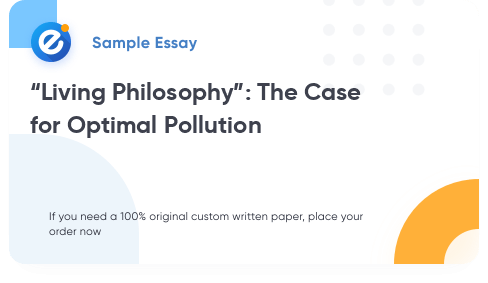
In the article The Case for Optimal Pollution, Baxter’s concept focuses on the anthropocentrism. His key idea lies in the fact that the people are the humanists; that is why they have the moral duty to support and advance everything that is good for the humanity. Having the anthropocentric views, Baxter believes that the human beings are the most important creatures on Earth. The people must be in the center, and it is important to value the people more than other species on the planet. A lot of environmentalists had the same view on the place of the human on Earth. Being concerned with the person as the center of the universe, Baxter argues that all other non-human beings are of no value to the environment.
The author considers that every person is free to do whatever he or she wants to nature, in case it does not do any harm to other individuals. Baxter states that the humans have the right to pollute to the certain extent, even if it does harm to other creatures. The people may contaminate the nature in case it provides benefits. Pollution may exist if it does not harm the people themselves, but brings them the profit. In this case, Baxter does not take any other creatures into consideration. He thinks that the environmental protection is worth only if it is useful for the people. Otherwise, it is worthless. The author argues that it is not necessary to take care of the environment just for nature’s sake. Baxter focuses on the people’s safety, which shows his extrinsic value position. He writes that nature does not have any intrinsic value itself.
Calculate the cost of essay
Besides being the anthropocentrist, Baxter is the law professor. This fact has an impact on his worldview: he defends the humans, not animals or plants. He fights for the human rights and does not consider such a thing as equality between all the world creatures. In his article People or Penguins: The Case for Optimal Pollution, William F. Baxter writes that some scientists have studied that the use of DDT (dicophane) in the food production does harm to the penguins. However, the author does not agree that people should stop using this substance for the sake of penguins as it brings profit in agriculture.
Baxter agrees that it is necessary to use nature resources. However, today, people are utilizing these resources in a very careless way. They treat the nature recklessly and thoughtlessly. It causes such a destruction to the ecosystem that it will be impossible to restore it soon. The modern people are too demanding nowadays. They require more and more resources to satisfy their needs. Of course, the production is rapidly increasing, but at the same time the condition of the environment is becoming worse. The people have to understand that nature cannot repair itself; for this reason, people should not waste any resources (Baxter, 1974).
Limited Time
special offer
While reading this article, I thought if it would be possible to implement Baxter’s ideas in the US environmental issues. Due to the various climate zones, the USA has different flora and fauna. However, the lack of planning and a high level of the wastes play a negative role in the environment. There are a lot of natural resources available for the people, but they do not use them in a proper way. Fortunately, the situation is gradually changing, and nowadays the USA has a firm and steady growth. I agree that people should not waste any resources. The government should take this Baxter’s philosophical idea into consideration. Every citizen has to invest in improving the environmental situation.
To sum up, I asked myself if I agreed with Baxter’s environmental ethics. His view is interesting, but I tend to think that it is a little bit egoistic. The people cannot neglect the nature and treat it carelessly, as they belong to it; they are the part of it. Undoubtedly, all the decisions regarding the environment that human beings make should be good for the future generations. The author’s idea about the support of the people’s welfare is worth considering and implementing into life. To get benefits, one needs to give something of equal value in return. In my opinion, Baxter’s arguments are too radical. Finally, I can say that if one treats nature well, it will definitely pay back.

